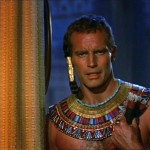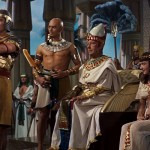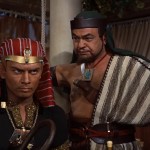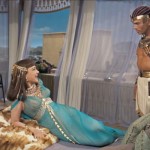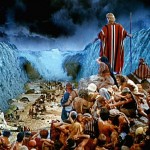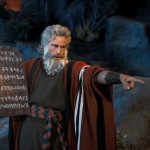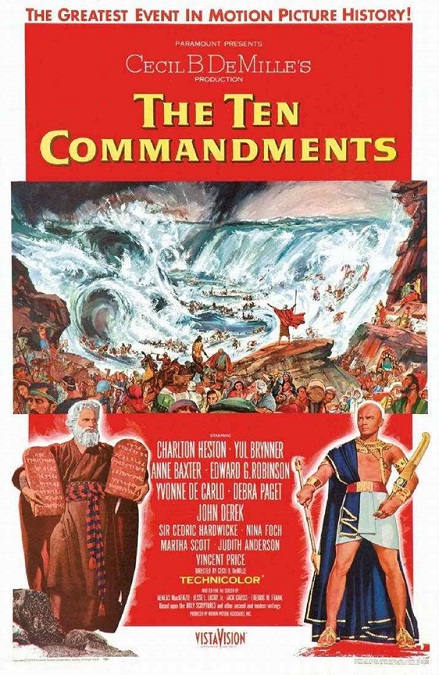
The Ten Commandments – 1956
I need to start this off by saying that I liked the movie. I had a few issues with some of its theology and some of its content, but overall, I enjoyed watching it. I do so love a good epic, and this one sure qualified. Charlton Heston played the lead as Moses, the iconic biblical figure. The film follows the Hebrew’s rise to power as an unwitting Egyptian, his discovery of his true heritage, his exile, his conversion to the Hebrew religion, his mission to free the enslaved nation of Isreal, their exodus into the desert, and finally, his receiving of the Ten Commandments from God, himself.
There was a grandeur about the film. It was made on a massive scale. The sets were big, the colors were bright, the story was grand, and the characters were larger than life. The costumes were elaborate and beautiful, thanks once again to Edith Head and a few others. It was visually stunning and the special effects, though I’ll admit that some of them were cheesy by today’s standards, were quite impressive for the 1950s. The big scene of the parting of the Red Sea was incredibly well done. I’ll wager to say that nobody had ever seen anything like it.
But there were a few points that the three and a half hour movie skipped. If I had the means to make a modern version of the film, I would do a few things differently. I would show more than just three of the ten plagues. I would take the time to show them all. And I would make sure that the reasons for them were clearer. I would make a greater point of showing Moses’s reluctance to be the Lord’s emissary. I would do my best to minimize the irrelevant romantic subplot between Joshua and Lilia, and I would completely cut the man-hungry sisters of Sephora.
But in the scope of the big picture, those things are relatively minor. There were no bad performances. Heston’s Moses was overacted, but he somehow took on an air of mystery and even danger that served him well. Yul Brynner played Rameses II, the heir to the Egyptian throne, and I thought he did an excellent job. His father Sethi was wonderfully played by Sir Cedric Haredwicke. The intended bride of the next Pharaoh is Nefretiri, played by Anne Baxter. I actually loved her performance. It was also over acted and melodramatic, but I thought it was just perfect for the overly dramatic personality of the character. The made-up character of Dathan, played by Edward G. Robinson, was annoying, but somewhat understandable as a plot device. The afore-mentioned Joshua was played by John Derek, and he did a pretty good job. His fictional girlfriend, Lilia, was played by Debra Paget. And finally, Yvonne De Carlo played Moses’ wife Sephora.
I also have to make special mention of the music, written by Elmer Bernstein. It was grand and fit the epic nature of the film well. But though the movie was nominated for 7 Academy awards, a Best Music nomination was not among them. Aside from its Best Picture nomination, it was also nominated for Best Visual Effects, which was its only win, Best Color Art Direction, Best Color Cinematography, Best Color Costume Design, Best Film Editing, and Best Sound Recording. A pretty good list in terms of production standards. But notice how none of the actors received any nominations for their work. Strange.
Still, I would think that one of the most popular films ever made would have earned more than one award from the Academy. According to Wikipedia, it is “one of the most financially successful films ever made, grossing approximately $122.7 million at the box office during its initial release. It was the most successful film of 1956 and the second-highest grossing film of the decade. According to Guinness World Records, in terms of theatrical exhibition, it is the seventh most successful film of all time when the box office gross is adjusted for inflation.”
So what six movies are ahead of The Ten Commandments? A pretty impressive list: Gone With the Wind (1939), Avatar (2009), Star Wars (1977), Titanic (1997), The Sound of Music (1965), and E.T. The Extra-Terrestrial (1982). Personally, I think it should have won the Best Picture award, but it lost to Around the World in 80 Days.
